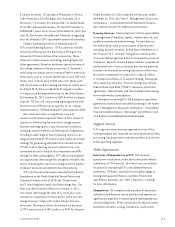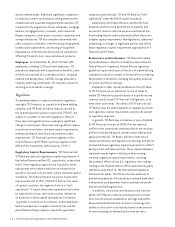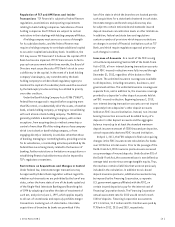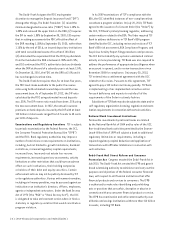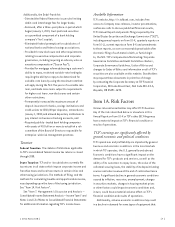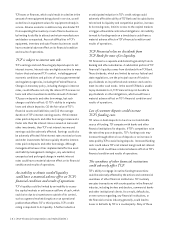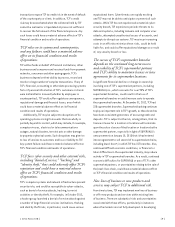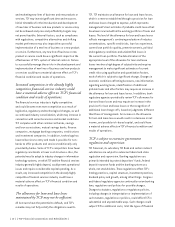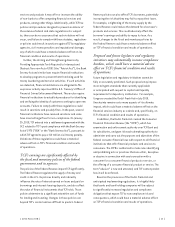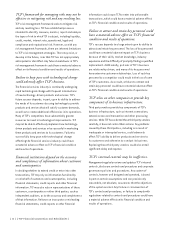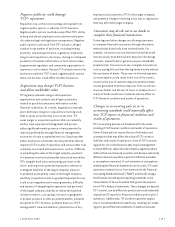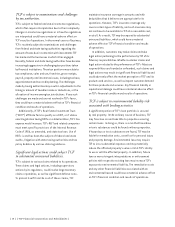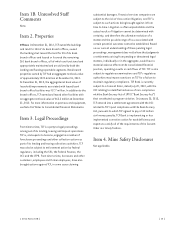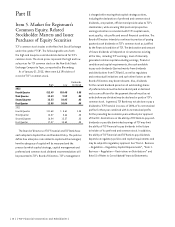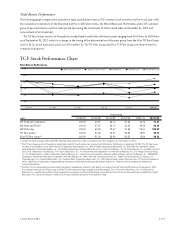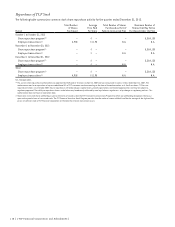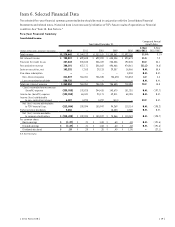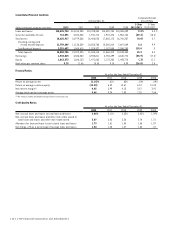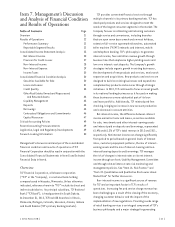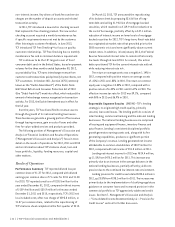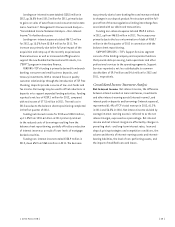TCF Bank 2012 Annual Report Download - page 29
Download and view the complete annual report
Please find page 29 of the 2012 TCF Bank annual report below. You can navigate through the pages in the report by either clicking on the pages listed below, or by using the keyword search tool below to find specific information within the annual report.Negative publicity could damage
TCF’s reputation.
Reputation risk, or the risk to earnings and capital from
negative public opinion, is inherent in TCF’s business.
Negative public opinion could adversely affect TCF’s ability
to keep and attract employees and customers and expose
it to adverse legal and regulatory consequences. Negative
public opinion could result from TCF’s actual or alleged
conduct in any number of activities, including lending
practices, corporate governance, regulatory compliance,
mergers and acquisitions, disclosure, sharing or inadequate
protection of customer information or from actions taken
by government regulators and community organizations in
response to such conduct. Because TCF conducts most of its
businesses under the “TCF” brand, negative public opinion
about one business could affect its other businesses.
Acquisitions may disrupt TCF’s business
and dilute stockholder value.
TCF regularly evaluates merger and acquisition
opportunities and conducts due diligence activities
related to possible transactions with banks or other
financial institutions. As a result, negotiations may take
place and future mergers or acquisitions involving cash,
debt or equity securities may occur at any time. TCF
seeks merger or acquisition partners that are culturally
similar, have experienced management and possess
either significant market presence or have potential for
improved profitability through financial management,
economies of scale or expanded services. Acquiring other
banks, businesses or branches involves potential adverse
impact to TCF’s results of operations and various other risks
commonly associated with acquisitions, such as: difficulty
in estimating the value of the target company; payment
of a premium over book and market values that may dilute
TCF’s tangible book value and earnings per share in the
short- and long-term; potential exposure to unknown or
contingent liabilities of the target company; exposure
to potential asset quality issues of the target company;
volatility in reported income as goodwill impairment losses
could occur irregularly and in varying amounts; difficulty
and expense of integrating the operations and personnel
of the target company; inability to realize the expected
revenue increases, cost savings, increases in geographic
or product presence or other projected benefits; potential
disruption to TCF’s business; potential diversion of TCF
management’s time and attention; potential loss of key
employees and customers of TCF or the target company;
and potential changes in banking or tax laws or regulations
that may affect the target company.
Consumers may decide not to use banks to
complete their financial transactions.
Technology and other changes are allowing consumers
to complete financial transactions through alternative
methods that historically have involved banks. For
example, consumers can now maintain funds that would
have previously been held as bank deposits in brokerage
accounts, mutual funds or general-purpose reloadable
prepaid cards. Consumers can also complete transactions
such as paying bills and transferring funds directly without
the assistance of banks. The process of eliminating banks
as intermediaries could result in the loss of fee income,
as well as the loss of customer deposits and the related
income generated from those deposits. The loss of these
revenue streams and the loss of lower-cost deposits as a
source of funds could have a material adverse effect on
TCF’s financial condition and results of operations.
Changes in accounting policies or in
accounting standards could materially affect
how TCF reports its financial condition and
results of operations.
TCF’s accounting policies are fundamental to the under-
standing of its financial condition and results of operations.
Some of these policies require the use of estimates and
assumptions that may affect the value of TCF’s assets or
liabilities and results of operations. Some of TCF’s account-
ing policies are critical because they require management
to make difficult, subjective and complex judgments about
matters that are inherently uncertain and because materially
different amounts would be reported if different estimates
or assumptions were used. If such estimates or assumptions
underlying the financial statements are incorrect, TCF could
experience material losses. From time to time the Financial
Accounting Standards Board (“FASB”) and the SEC change
the financial accounting and reporting standards or the
interpretation of those standards that govern the prepara-
tion of TCF’s financial statements. These changes are beyond
TCF’s control, can be difficult to predict and could materially
impact how TCF reports its financial condition and results of
operations. Additionally, TCF could be required to apply a
new or revised standard retrospectively, resulting in it restat-
ing prior period financial statements in material amounts.
{ 2012 Form 10K } { 13 }


